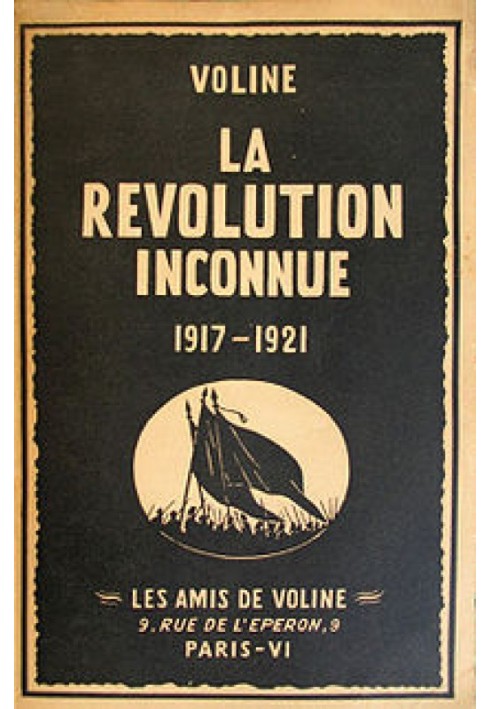Unknown revolution 1917-1921
 Instant download
Instant download
after payment (24/7)
 Wide range of formats
Wide range of formats
(for all gadgets)
 Full book
Full book
(including for Apple and Android)
Wolin’s book “The Unknown Revolution” is the most significant anarchist history of the Russian Revolution ever published in different languages. Its author, as we have seen, was a direct witness and active participant in the events described. Like Kropotkin's history of the French Revolution, it tells the story of what Wolin calls the "unknown revolution," that is, a popular social revolution distinct from the Bolshevik seizure of political power. Before the appearance of Volin's book, this topic was almost not discussed. For Volin, the Russian Revolution was not limited to the actions of Kerensky and Lenin, the Social Democrats, the Socialist Revolutionaries, or even the anarchists. It represented an explosion of mass discontent and mass creativity, spontaneous, unplanned and non-political - a genuine social the revolution that Bakunin had foreseen half a century earlier. As a great popular movement, a “revolt of the masses,” the Russian Revolution needed Wolin to have its history examined “from below,” as Kropotkin and Jean Jaurès had done for the revolution in France. “The whole enormous multitude of people finally came to the fore,” wrote Jaurès about 1789. The same can be said about Russia in the period 1917–1921, when the country underwent profound changes that affected all spheres of life and in which ordinary people played the most important role. Similar processes took place in Spain in 1936–1939. It was in Russia and Spain that the greatest libertarian revolutions of the twentieth century took place - decentralist, spontaneous, egalitarian, carried out not by any one party or group, and above all by the people themselves. The most outstanding feature of this “unknown revolution” was, according to Wolin, the decentralization and dispersal of power, the spontaneous formation of autonomous communes and councils, and the emergence of self-government for the working people of town and countryside. Indeed, all modern revolutions were accompanied by the creation of local committees - factory and house committees, educational and cultural, soldiers, sailors and peasants - which were born from the flowering of direct action from the grassroots. In Russia, the people's bodies of direct democracy were the Soviets - until the Bolsheviks turned them into instruments of centralized power, auxiliary structures of the new bureaucratic state. This is Wolin's main thesis. He describes in detail the efforts of workers, peasants, intellectuals who sought create a free society based on the principles of local initiative and autonomy. Libertarian opposition to the new Soviet dictatorship, mainly in Kronstadt and Ukraine, receives wide coverage in his book. The author talks with deep sympathy about the Makhnovist movement, without, however, glossing over its negative features, such as Makhno’s drunkenness or the formation of a kind of military camarilla around him. (As already noted, Volin disagreed with Makhno on the issue of the “Organizational Platform,” and the contradictions between them were never completely resolved.) However, Volin’s book is not without some shortcomings. Speaking about the prehistory of the Russian revolutionary movement, the author only casually mentions the great peasant-Cossack uprisings of the 17th and 18th centuries, without taking into account their pronounced anti-statist character. Despite all their “primitive” features, the uprisings of Razin and Pugachev were still anti-authoritarian actions, a struggle for a decentralized and egalitarian society. Further, oddly enough, Wolin does not write at all about anarchists in the chapter devoted to the revolution of 1905, although it was then that Russian anarchists first emerged as a serious force playing an important role in the events that took place. (It is worth remembering that Volin was a socialist revolutionary at that time and switched to the position of anarchism only in 1911). Volin’s description of the social revolution of 1917 also requires additions. Very little is said in his book about the workers' and peasants' movement outside Kronstadt and Ukraine; individualist anarchists are ignored, interesting, albeit a relatively small group; The role of women in the anarchist and revolutionary movements is not reflected either. But it was women - in bread lines and strike pickets, at demonstrations, on barricades and in partisan detachments, convincing soldiers and their fellow workers, creating free schools and kindergartens, captured by the universal desire for dignity and equality - who played the main role in that very “unknown revolution” that was the focus of the author’s attention. It must also be added that Volin’s book suffers from stylistic errors. According to George Woodcock, Wolin "was not a fine writer in the literary sense." He had a penchant for verbosity, and his story would have benefited from more condensation. And yet, despite all its shortcomings, The Unknown Revolution is an impressive work. This is a pioneering exploration of a little-known aspect of the Russian Revolution. With the partial exception of the history of the Makhnovist movement of Arshinov and the history of the Bolshevik repressions of Maximov, this is the only work of this kind.
(c) A. Dubovik
Data sheet
- Name of the Author
- Всеволод Волин Михайлович
- Language
- Ukrainian
- Release date
- 2005
- Translator
- Юлия В. Гусева
Reviews
Вражаюче дослідження невідомих аспектів революції!
Книга Воліна «Невідома революція» є справжнім відкриттям для тих, хто цікавиться історією Російської революції. Автор, будучи свідком подій, пропонує унікальний погляд на соціальну революцію, яка відбулася в 1917-1921 роках, акцентуючи увагу на народному русі та децентралізації влади. Він детально описує зусилля робітників, селян та інтелігентів, які прагнули створити вільне суспільство, що базується на принципах місцевої ініціативи. Книга не лише розкриває маловідомі факти, але й спонукає до роздумів про роль простих людей у великих історичних подіях. Незважаючи на деякі недоліки в стилі та відсутність певних аспектів, ця праця є важливим внеском у вивчення революції та заслуговує на увагу всіх, хто прагне зрозуміти глибину соціальних змін того часу. Рекомендую всім, хто хоче дізнатися більше про справжню суть Російської революції!











